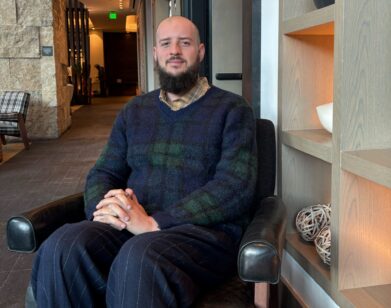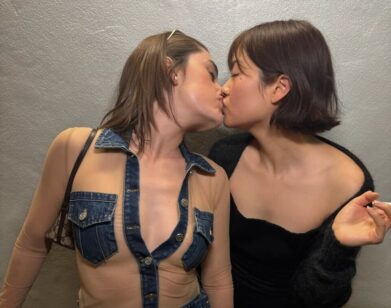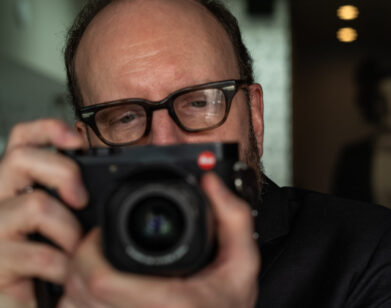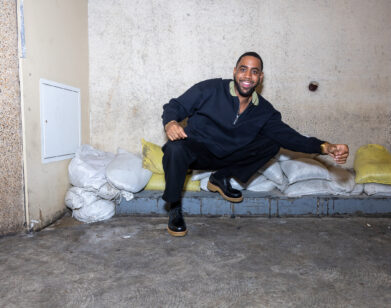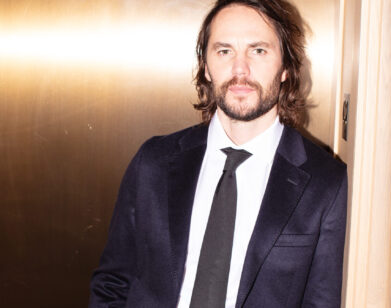Working-Class Hero
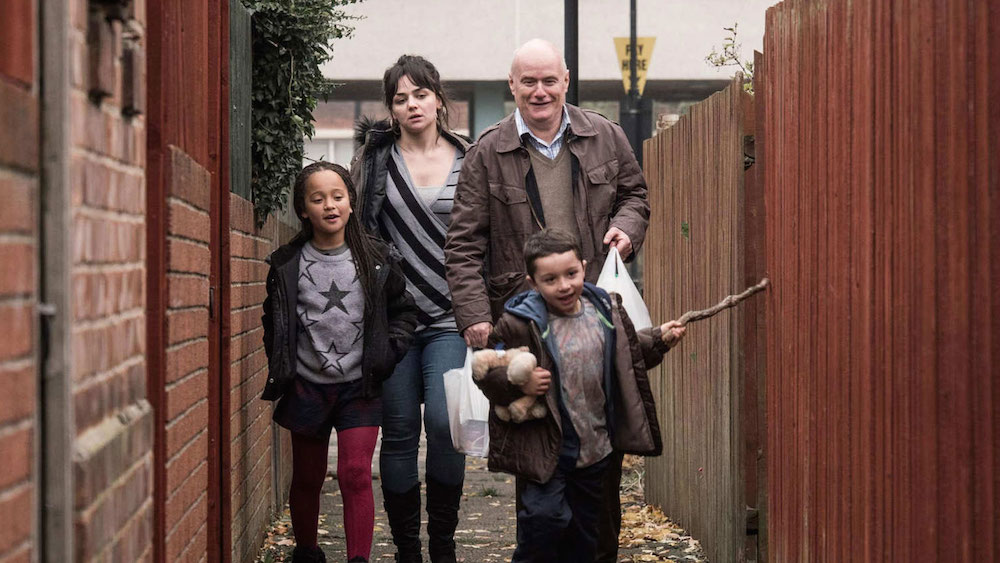
ABOVE: (LEFT TO RIGHT) BRIANA SHANN, HAYLEY SQUIRES, DAVE JOHNS, AND DYLAN MCKIERAN IN I, DANIEL BLAKE. PHOTO JOSS BARRATT, COURTESY OF SUNDANCE SELECTS.
In I, Daniel Blake, Ken Loach’s Palme d’Or-winning plea on behalf of the working class, Dave Johns plays the titular Mr. Blake, a 59-year-old carpenter in Newcastle recovering from a heart attack. Though Blake’s doctors tell him he isn’t fit to go back to work, the medical professional assigned to assess him for disability benefits disagrees, and he is left in a bureaucratic blind spot, struggling to support himself. “Daniel could be your father, he could be your grandfather, he could be your uncle,” says Johns. “It’s ordinary people who have been on hard times, and the state is failing them.”
You would never know it from his heart-wrenching performance, but I, Daniel Blake is Johns’s first feature film. In real life, the Newcastle native earns a living as a stand-up comic, and when we talk to him on the phone, he is backstage at a gig waiting to perform. “Comics make good actors, because they’re used to telling the truth,” he says. “All the direction Ken said to me, was, ‘There’s little music in this film, so the actor is very exposed. All you need to do when you’re in scenes is listen. If you find the truth, you’ll get the real emotion and the emotion will show on screen.”
After premiering at Cannes, I, Daniel Blake screened at festivals around the world including the Toronto International Film Festival, the New York Film Festival, and AFI Fest. Earlier this month, Johns won Best Actor at the British Independent Film Awards. “People are very moved everywhere we’ve gone,” Johns reflects.
EMMA BROWN: How did you become a comic?
DAVE JOHNS: I worked in construction when I left school. I went down to London to see a comedy show and ended up at the Comedy Store. I thought, “Wow, this is pretty cool.” I came back up to Newcastle, and I used to do part-time work at a local theater. They had a restaurant that wasn’t doing any business, so I started my own comedy club. That’s how I got into stand-up. I made my debut at my club. I did my first gig there in 1989 with two British comedians called Jo Brand and Jack Dee, who are quite famous now. Being funny came quite easy to me. I used to do it when I was in school and when I was at work. I think it was natural; comedy found me, rather than the other way around.
BROWN: When’s the last time you died on stage?
JOHNS: [laughs] Well, not for a while. I’ve been doing stand-up for 27 years, but there’s always a death around the corner, so you can’t be too complacent. I think if you’ve been doing it as long as I have, if you have a death on stage now, it doesn’t worry you as much as it used to when you were starting off. You could actually quite enjoy it. You can play with the comedy—play with the idea of it. It depends on how you die; if the audience are giving you a hard time, or you’re just not going down well, then you can play that death by calling out what’s happened to you on stage. A few times I’ve done that. There is an American comic who does it great: Andy Kindler. He’s a legend—how he can call the death on stage and just play around with it.
BROWN: I heard that you when you first started, you had a stage name taken from a jockey. Is that true?
JOHNS: Yes. [laughs] Cause of British Equity, there was another actor called Dave Johns, so they wouldn’t let me have my name. Back then, when I started, you had to have an Equity card to do any sort of work on stage in a play. I used to like the horses, and there was a jockey called Steve Cauthen that rode over in England, so I called myself Steve Cauthen.
BROWN: When did you start doing acting in plays?
JOHNS: In 2003, me and a lot of comedians from England, we did 12 Angry Men, the Reginald Rose courtroom drama, at the Edinburgh Festival. It was a straight play, but with 12 comedians in it. It was a big, big hit. Every year, we started doing plays. We did One Flew Over the Cuckoo’s Nest, which the producers persuaded Christian Slater to be in, and that went to the West End. So we did the West End with Christian Slater and a load of comics. We did The Odd Couple with comedians. That’s how I got into acting. Then I auditioned for Ken Loach in this film and was offered the part, and it’s my first film.
BROWN: What made you choose 12 Angry Men to begin with?
JOHNS: 12 Angry Men has always been my favorite film with Henry Fonda in it, and we were just looking for a play that would have a lot of guy’s parts in it. Like I said, it was such a hit that we looked for other shows. We also wrote a stage adaptation of Shawshank Redemption, which is on tour in Great Britain at the moment now. Me and Owen O’Neill, he’s another comic, got the rights to adapt the short story by Stephen King and we did that with some comedians up in Edinburgh.
BROWN: Did you consciously decide to do these serious plays with only comedians, or did it just end up that way?
JOHNS: We wanted to show what comedians can do besides just being funny—that everyone in the show could have a serious side, especially in acting. You have to communicate on stage as a comedian. You’re on by yourself. I think that comedians are good communicators and that’s why they probably make good actors.
BROWN: For I, Daniel Blake, I heard that you were only given a couple of pages of the script at a time while you were filming.
JOHNS: Yeah, Ken doesn’t give you the full script. It means that you can’t look at page 26 and say, “Oh, look, this is a big scene,” and have any preconceived idea of how you’re gonna play it. Ken gives you a couple of pages the day before, you learn it, and then you play it. He wants to feel the emotion. He shoots chronologically, so he actually takes you through the character’s life. He doesn’t have closed sets—when we used a shop, we just used the live shop with ordinary shoppers in it, and you film them in-between them buying things. That’s why Ken’s films have such a real reality to them, because he puts his actors in real situations.
BROWN: Did he tell you the overall arc of what was going to happen to Daniel?
JOHNS: No, no not at all. The first day filming, I knew I was Daniel Blake. I knew my wife had just died; I’d been looking after her. I’d had a big heart attack, I was applying for benefits and I was gonna have trouble getting social security. I would meet a single mum who had two kids and we’d become friends. That’s all I knew on the first day of filming. I didn’t know the end of the film until the day before we filmed it.
With the food bank scene, I didn’t know that was going to happen. The only people that knew were Ken, the crew, and Hayley [Squires], who played the scene. So for everybody in that scene, it was quite shocking. You get the real emotion through it. Basically, you just live in the scene. Each day, you’re living this life, and things are revealed to you. That’s why we get the full emotion straight away—you actually see it happening in front of you. There’s no way of planning how you play the scene.
The way Ken works, it’s a very safe environment. Ken has used the same crew for years. The camera is in the corner. He never tells you what lens he’s got on the camera, so basically it’s just Ken, the sound guy, and the film crew and you, who are in the scene. There are times you don’t feel like you’re making a movie; you forget that the camera is there. They are the best moments when you forget.
BROWN: When Ken first told you about Daniel, did he feel familiar? Was there anything about him that you found hard to relate to?
JOHNS: My father used to be a carpenter when I was a kid, and I’ve worked on buildings, so I’ve probably come across guys like Daniel all my life. He’s an ordinary guy. I think that it speaks to people because it has an honesty—that’s why people find it so moving… It’s about the working poor; it’s about people who are being told that the reason they haven’t got on in life is because it’s their fault.
BROWN: What do you think the solution is?
JOHNS: We have to start thinking about how we react with each other. I know with Brexit in Britain, it’s a mistake. I think that Europe should be staying together and working it out together … The working class for a lot of years has just been vilified and been used as a scapegoat, because they have no voice. We have to change. The only way you can change is by voting people in who are going to carry forward what your wishes are.
I, DANIEL BLAKE COMES OUT IN SELECT THEATERS THIS FRIDAY, DECEMBER 23, 2016.


